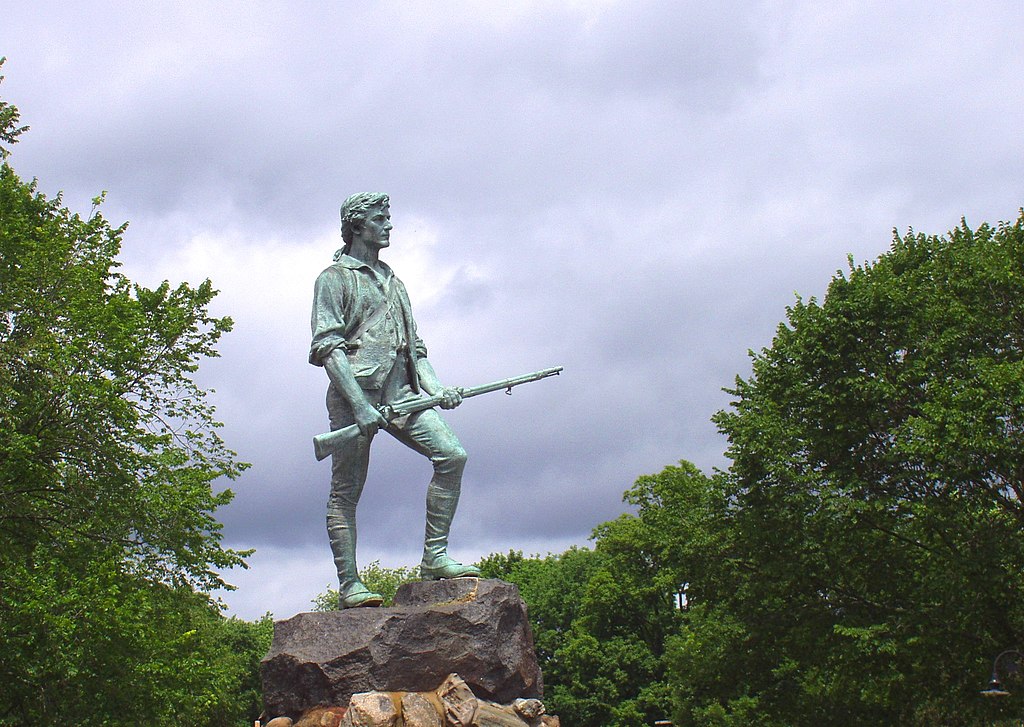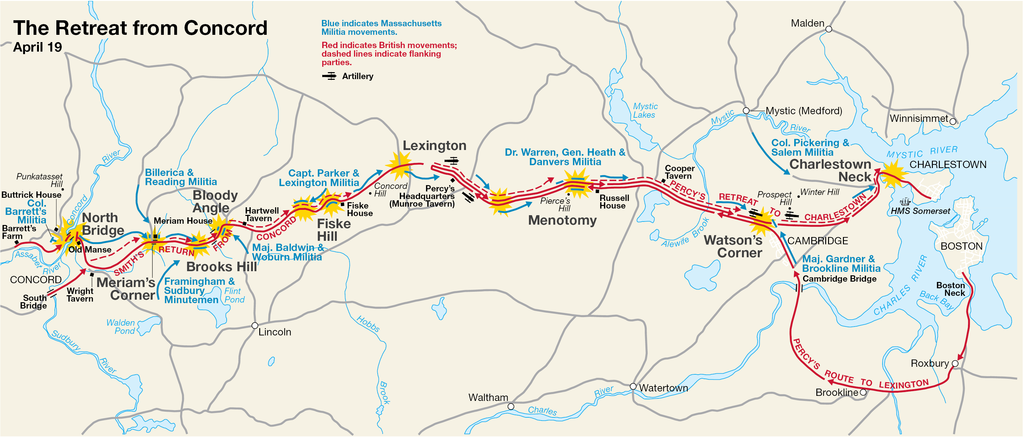
By Dave Workman
Editor-in-Chief
By the rude bridge that arched the flood,
Their flag to April’s breeze unfurled,
Here once the embattled farmers stood
And fired the shot heard round the world.
–Ralph Waldo Emerson, Concord Hymn
April 19, 1775. It began as a typical Spring morning in the Massachusetts Colony, and it would end with the birth of a nation.
Historians have dissected and written about the events of that day 248 years ago when British Regulars dispatched to seize the arms and supplies of the colonial militia at Concord committed what history could justifiably say was the stupidest military blunder ever committed in the name of the British Empire.
The long and short of it is often explained thusly: The Regulars killed some Colonials and the Colonials killed them back.
It’s not quite that simple, of course. According to a lengthy and well-documented discussion at Wikipedia, the shooting was precluded by growing troubles over taxes without any sign from Parliament that colonial concerns were of any real interest in London (“No Taxation without Representation”). There was what Parliament and the King considered an outrage, the Boston Tea Party in mid-December 1773. In 1774, militias began training for possible hostilities after the Massachusetts Provincial Congress called for such preparations. In reaction, Parliament determined that Massachusetts was in a state of rebellion.
There was not yet gunsmoke in the air, but it was only a matter of time, and time ran out on the Lexington commons not long after sunrise on April 19.
General Thomas Gage may not have wanted open conflict, but that’s what he got when he dispatched 700 Regulars under Lt. Col. Francis Smith to make an overnight march to destroy militia munitions believed to be stored at Concord. But the Colonials got word weeks in advance this might happen, so they moved their supplies to other locations, according to Wikipedia and various histories of the events.
When the first of Smith’s troops arrived at Lexington, they were faced by about 80 militia members who emerged from Buckman Tavern and formed up while some locals became spectators. The militia was under the command of Capt. John Parker, who ordered his men not to provoke a confrontation, but popular history quotes him stating, “Stand your ground. Don’t fire unless fired upon. But if they mean to have a war, let it begin here.” Those words are engraved in stone at the Minuteman Monument in Lexington.
Parker reportedly ordered his militia to disperse, but allegedly a British officer fired his pistol, at which point British troops opened fire. Eight Colonials were killed, and the fight was on.
The Regulars marched on toward Concord, while word spread throughout the countryside. Depending upon to which version of history one subscribes, every man with a gun came running. By the time the British column arrived near Concord, there were several hundred militia members from nearby towns gathered on a hill overlooking the North Bridge, and more kept coming.
This is where Emerson’s poem takes shape, and history became the stuff of legend, or vice versa. Concord Bridge is where the real shooting started, but it did not end there. For the rest of that day, there would be the smell of gunpowder along the road back. The National Park Service created a map of the day’s events showing the lines of movement and retreat.

After skirmishing with the militia, the Regulars began the long march back to Boston, with Colonials following them and firing from the flanks well into the afternoon, by which time some estimates go as high as 2,000 to 4,000 militiamen from several towns and villages had arrived. There were volleys and individual fire, something the Regulars reportedly complained about in the aftermath.
The distance from Concord back to Boston was roughly 18 miles, about the distance from a new nation back to the comforts of an old one whose welcome had been overstayed.
Colonial militiamen were shooting at the Regulars from behind rock walls and trees, something they had apparently never before encountered. Battles in Europe were typically fought by two armies which marched towards one another, stood in line and fired in volleys. This was not the type of battle “civilized” armies fought.
Welcome to America!
The retreating British troops were eventually rescued and reinforced by troops led by Earl Percy. But they had suffered greatly, not just in the losses of men, but in terms of morale. The mightiest army in the world at that time had just been humbled by a bunch of farmers. There had been quite a bit of killing on both sides, and a line had been crossed that could never bre crossed back.
Perhaps the greatest irony is that it all happened in Massachusetts over an attempt by the existing government of the time to disarm the citizenry. The times may have changed, but the fight still seems to be in progress. Massachusetts is now a state with some of the most restrictive gun laws in the nation. How would Capt. John Parker react to that, one wonders.
Instead of militia, today’s battles are being fought by attorneys. They don’t use powder and ball, but three Supreme Court rulings, various state constitutional provisions and an annoying 27-word line in the Bill of Rights known as the Second Amendment.



